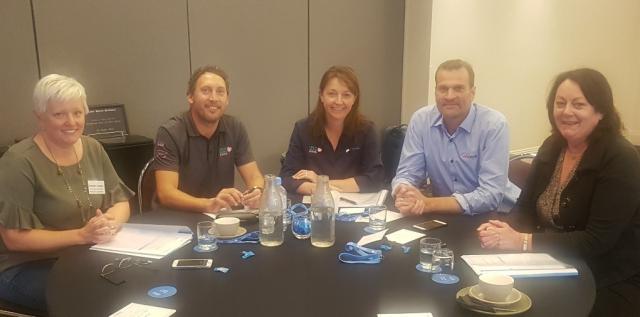Timely training for pork industry

With African swine fever outbreaks occurring in China, Eastern Europe and Africa in 2018, Australia’s pork industry appreciated recent emergency animal disease training delivered by Animal Health Australia.
Five pork industry representatives from Western Australia joined 11 counterparts from other Australian jurisdictions in Melbourne to participate in livestock industry liaison training in November 2018.
West Australian Pork Producers Association (WAPPA) member Emalyn Loudon said the training was for industry members nominated by their peak livestock industry councils to carry out livestock industry liaison during an emergency animal disease response.
“Australian Pork Limited (APL) is the pork industry’s peak industry council, and is a signatory to the Emergency Animal Disease Response Agreement (EADRA),” Ms Loudon said.
“APL appoints trained representatives to carry out the industry liaison role during an emergency response, who then provide an official conduit between the response team and the affected industry.
“During a response, the industry liaison function communicates the industry’s position on policy and proposed response activities.
“The function also provides advice on the availability of industry resources which could be deployed during a response.”
Ms Loudon said the training participants had discussed the key attributes of nominees for the liaison function.
“We identified that an in-depth understanding of the industry and its key contacts were crucial to the role, as well as good communication skills and the ability to work in high-stress environments, as would be the case in a Local Control Centre or State Coordination Centre,” she said.
The training program included an overview of the legislation, agreements, plans and groups related to an emergency animal disease response; typical routines in a control or coordination centre; government decision-making processes in a response; and some tips on communicating.
Ms Loudon said the day also highlighted the importance of the relationship between APL and the state producer organisations during a response.
“Participants concluded that WA could enhance their preparedness for an emergency animal disease by WAPPA and APL discussing in advance the appointment of suitable people for the role and how the national and state organisations interact during an outbreak,” she said.
“Selection for the role could be enhanced by summarising the attributes of individuals trained for the role and scenario-planning for when they would be best retained within their own businesses during an outbreak rather than working in a control or coordination centre.”
Ms Loudon said that with African swine fever outbreak in China in 2018, it was important that all stakeholders continued to strengthen efforts on prevention and preparedness activities to protect the Australian pork industry.
Industry members who are interested in participating in training can contact their peak industry council or Animal Health Australia at trainingsupport@animalhealthaustralia.com.au
Read more on the DPIRD website about African swine fever.
